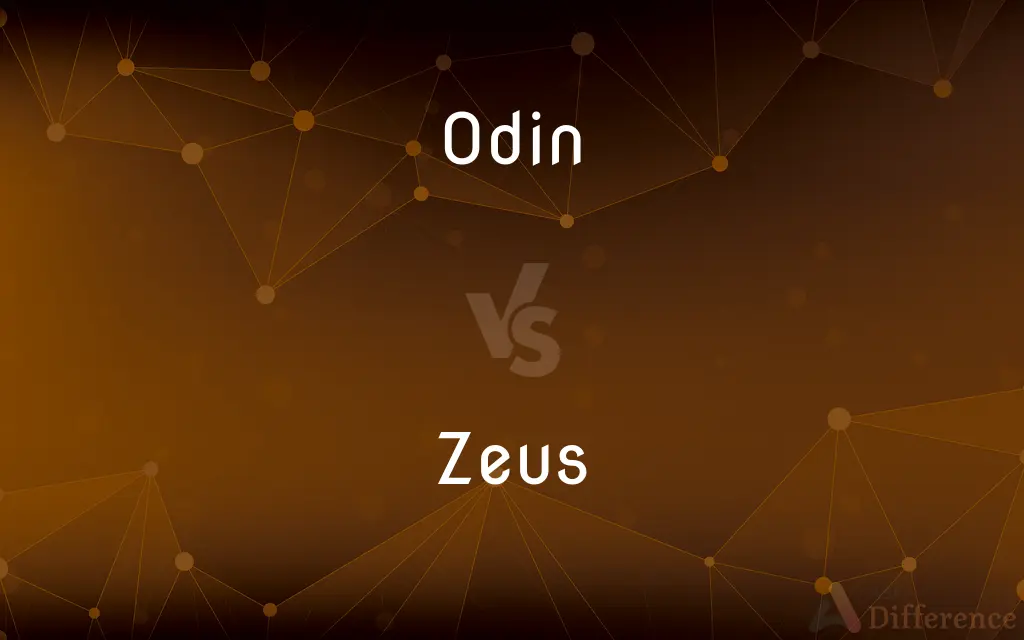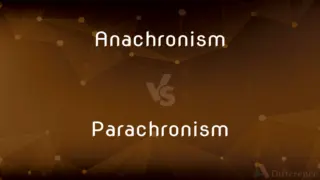Odin vs. Zeus — What's the Difference?
By Tayyaba Rehman & Maham Liaqat — Updated on April 17, 2024
Odin, the chief god in Norse mythology, is known for his wisdom and sacrifice, whereas Zeus, the principal deity of Greek mythology, is renowned for his power and authority.

Difference Between Odin and Zeus
Table of Contents
ADVERTISEMENT
Key Differences
Odin is a central figure in Norse mythology, revered as a god of war, wisdom, and death. He is often depicted as a seeker of knowledge, even sacrificing his eye for greater wisdom. Zeus, on the other hand, rules as the king of the gods in Greek mythology and is associated with the sky, lightning, and justice. He is characterized by his dominant role and frequent interventions in the affairs of gods and humans.
Odin’s role extends to magic and prophecy, being deeply associated with runes and seidr (a form of sorcery). He is a complex figure, often engaging in quests for understanding and manipulation of fate. Whereas Zeus is primarily seen as a powerful force maintaining order and exacting punishment, often using his control over natural elements like thunder and lightning to assert his will.
Odin is known for his shamanistic qualities, often wandering the Earth in disguise to interact with mortals, reflecting his introspective and expansive nature. Zeus, meanwhile, is typically portrayed in majestic splendor, rarely disguising himself (except in pursuits of love), which underscores his extroverted and commanding personality.
In Norse mythology, Odin’s rule is marked by a sense of impending doom and a focus on the heroic and tragic lives of the Norse gods, who face their inevitable destruction during Ragnarok. In contrast, Greek mythology often portrays Zeus as eternally ruling over Olympus, with a focus on the cyclical nature of triumphs and challenges among the gods.
Odin’s narratives often highlight themes of sacrifice and the pursuit of esoteric knowledge. This is emblematic in tales where he hangs himself on the world tree, Yggdrasil, to gain knowledge of the runes. Zeus’ narratives, however, often revolve around governance, his relationships with other gods, and interventions in mythical wars and the lives of heroic figures.
ADVERTISEMENT
Comparison Chart
Domain
War, wisdom, death
Sky, lightning, justice
Symbolism
Ravens, wolves, spear
Thunderbolt, eagle, scepter
Personality Traits
Wise, secretive, sacrificial
Powerful, authoritative, reactive
Mythological Importance
Prophetic, magical abilities
Ruler of gods, order enforcer
Cultural Representation
Shamanistic, wanderer
Kingly, overt ruler
Compare with Definitions
Odin
Associated with magic.
Odin uses runes and seidr to manipulate events and see the future.
Zeus
God of the sky and thunder.
Zeus wields his thunderbolt to punish those who defy him or disrupt order.
Odin
God of war and death.
Odin decides the fate of soldiers in battle, welcoming the slain to Valhalla.
Zeus
Upholder of justice.
Zeus intervenes in mythical narratives to ensure justice is served.
Odin
Symbolized by ravens.
Odin’s ravens, Huginn and Muninn, fly across the world to bring him news.
Zeus
Known for numerous affairs.
Zeus is infamous for his romantic escapades, often transforming to woo his lovers.
Odin
Seeker of wisdom.
Odin sacrificed his eye at Mimir’s well to gain cosmic knowledge.
Zeus
King of the gods.
Zeus rules over both Olympus and the earthly realm, enforcing divine law.
Odin
Characterized by wanderlust.
Odin often roams the Earth disguised as a traveler to learn about human nature.
Zeus
Symbolized by the eagle.
Zeus is often depicted with an eagle, representing his sovereign rule.
Odin
The supreme god and creator, god of victory and the dead. Wednesday is named after him.
Zeus
Zeus is the sky and thunder god in ancient Greek religion, who rules as king of the gods of Mount Olympus. His name is cognate with the first element of his Roman equivalent Jupiter.
Odin
The god of wisdom, war, art, culture, and the dead, and the supreme deity and creator of the cosmos and humans.
Zeus
The principal god of the Greek pantheon, ruler of the heavens, and father of other gods and mortal heroes.
Odin
The supreme deity of the Scandinavians; - the same as Woden, of the German tribes.
There in the Temple, carved in wood,The image of great Odin stood.
Zeus
The chief deity of the Greeks, and ruler of the upper world (cf. Hades). He was identified with Jupiter.
Odin
(Norse mythology) ruler of the Aesir; supreme god of war and poetry and knowledge and wisdom (for which he gave an eye) and husband of Frigg; identified with the Teutonic Wotan
Zeus
(Greek mythology) the supreme god of ancient Greek mythology; son of Rhea and Cronus whom he dethroned; husband and brother of Hera; brother of Poseidon and Hades; father of many gods; counterpart of Roman Jupiter
Zeus
Type genus of the family Zeidae
Common Curiosities
How do the end times differ in Norse and Greek mythology concerning Odin and Zeus?
In Norse mythology, Odin is destined to fall during Ragnarok, the prophesied end of the world involving a great battle. In Greek mythology, Zeus does not face an apocalyptic end but continues his rule over the gods and humanity.
What are the mythological origins of Odin and Zeus?
Odin originates from Norse mythology, primarily associated with the Scandinavian and Germanic cultures. Zeus is a central figure in Greek mythology, deeply rooted in the traditions of ancient Greece.
What is the significance of Odin’s and Zeus’s animal symbols?
Odin’s ravens and wolves symbolize his role as a god of war and his deep connection to knowledge and the mystical. Zeus’s eagle symbolizes his supreme sovereignty and his control over the skies.
What is the cultural impact of Odin and Zeus in modern times?
Odin is often seen in modern media as a figure of wisdom and mystical power, influencing works that explore themes of prophecy, fate, and heroism. Zeus is commonly portrayed as the quintessential powerful deity, influencing numerous creative works depicting themes of leadership, justice, and divine intervention.
What are some of the most famous myths involving Odin and Zeus?
One of Odin’s most famous myths involves his sacrifice to gain knowledge of the runes, while Zeus is well-known for his defeat of the Titans and his leadership in the Titanomachy.
How are Odin and Zeus depicted in artistic representations?
Odin is frequently depicted as an older, one-eyed man with a cloak and spear, often accompanied by his ravens and wolves. Zeus is typically shown as a robust, bearded figure with a thunderbolt or scepter, often seated on a throne.
How do Odin and Zeus influence warriors and heroes?
Odin is the patron of warriors, often choosing those who will die heroically in battle and live on in Valhalla. Zeus influences heroes by granting them powers or directly intervening in their quests, often as a decisive force in their fates.
Do Odin and Zeus have any shared characteristics?
Both Odin and Zeus are leaders of their respective pantheons and wield significant influence over other gods and mortal affairs. They are revered and feared for their power and authority.
How do Odin and Zeus manage their familial relationships?
Odin often interacts with his children, such as Thor and Loki, in ways that blend guidance and strategic planning. Zeus's relationships with his offspring, like Athena, Apollo, and Hercules, often involve direct paternal intervention and molding of their destinies.
How do their powers reflect their roles in mythology?
Odin’s powers of foresight and sorcery reflect his role as a guide to the mysteries of life and death, emphasizing the internal and philosophical. Zeus's control over natural forces like thunder and lightning underscores his role as an enforcer of order and his dynamic presence in the physical realm.
Share Your Discovery

Previous Comparison
Moron vs. Stupid
Next Comparison
Anachronism vs. ParachronismAuthor Spotlight
Written by
Tayyaba RehmanTayyaba Rehman is a distinguished writer, currently serving as a primary contributor to askdifference.com. As a researcher in semantics and etymology, Tayyaba's passion for the complexity of languages and their distinctions has found a perfect home on the platform. Tayyaba delves into the intricacies of language, distinguishing between commonly confused words and phrases, thereby providing clarity for readers worldwide.
Co-written by
Maham Liaqat














































